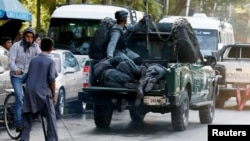The United States on Tuesday condemned “in the strongest terms” the latest series of deadly attacks in Kabul that killed and wounded dozens of security personnel and civilians, and it sought to reassure Afghanistan that it would work with Kabul for “a more secure, stable and prosperous” nation.
The Taliban claimed responsibility for those attacks.
“[Monday's] terrible attacks showed we still have to work to go after those entities on the ground, Taliban and others, and rule them out if they are going to continue to carry out those kinds of attacks,” State Department spokesman Mark Toner said.
Toner added that the U.S. would continue discussions with both Afghanistan and Pakistan to root out terrorists operating on the soil of both nations.
“The ultimate goal is we want to see peace and stability in the region,” he said.
Monday's series of attacks began with a twin suicide bombing in a busy area of Kabul, followed by a car bomb a few hours later in an area close to government offices and diplomatic compounds. After that, three gunmen holed themselves up close to a government complex near the office of a charitable organization, Care International. An Afghan official said security forces killed all three gunmen to end an hours-long overnight siege. The Care offices were damaged extensively.
Condemning the attacks as acts against “religion, human faith and humanity,” Afghanistan's Chief Executive Abdullah Abdullah said Kabul was fighting a war “against terrorists who are trained, advised, supported and instructed in our neighborhood," a veiled reference to neighboring Pakistan.
The Afghan government has long accused Pakistan, particularly its military institutions, of covertly supporting the Taliban insurgency in Afghanistan. Pakistan rejects the accusations.
But Vanda Felbab-Brown, a senior fellow at the Brookings Institution, a public policy research group in Washington, said any friction between Afghanistan and Pakistan “should not be an excuse by Kabul not to focus on improving politics and [good] governance.”
In a Brookings forum on U.S. policy toward Afghanistan on Tuesday, Felbab-Brown said Washington should engage both militarily and politically with Kabul, adding that the challenges facing Afghanistan are more about the evolution of the political process.







